
The Forge of God is a 1987 science fiction novel by American writer Greg Bear. Earth faces destruction when an inscrutable and overwhelming alien form of life attacks.

The Memory of Whiteness is a science fiction novel written by Kim Stanley Robinson and published in September 1985. It shares with the Mars trilogy a focus on human colonization of the Solar System and depicts a grand tour that travels from the outer planets inward toward the Sun, visiting many human colonies along the way. The different human societies on the various planets and planetoids visited are depicted in detail. The purpose of the tour is to stage concerts by the "Holywelkin Orchestra", a futuristic musical instrument played by a selected master. Readers follow the Orchestra and its entourage together with a journalist, who after some time detects a conspiracy that seems to be connected with a group of gray-clad, sun-worshipping monks. The tour ends near the planet Mercury in a solar station belonging to these "Grays", which controls the white line energy source for the whole Solar System.

Tik-Tok is a 1983 science fiction novel by John Sladek. It received a 1983 British Science Fiction Association Award.

Man of Two Worlds (1986) is a science fiction novel by American writers Brian and Frank Herbert.
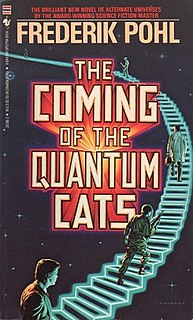
The Coming of the Quantum Cats is a 1986 science fiction novel by American writer Frederik Pohl. It was originally serialized in Analog science-fiction magazine, January–April 1986.
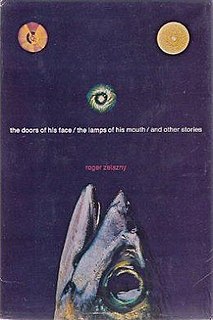
The Doors of His Face, The Lamps of His Mouth, and Other Stories is a collection of science fiction short stories by American writer Roger Zelazny. It was published in 1971 by Doubleday.
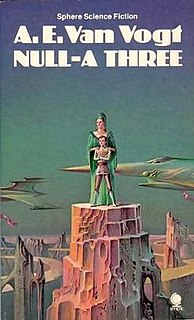
Null-A Three, usually written Ā Three, is a 1985 science fiction novel by A. E. van Vogt. It incorporates concepts from the General semantics of Alfred Korzybski and refers to non-Aristotelian logic.

The Status Civilization is a science fiction novel by American writer Robert Sheckley, first published in 1960.
Eon is a science fiction novel by American author Greg Bear published by Bluejay Books in 1985. Eon was nominated for an Arthur C. Clarke Award in 1987. It is the first novel in The Way series; followed by Eternity.
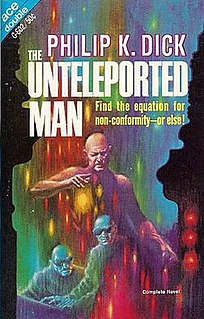
The Unteleported Man is a 1966 science fiction novel by American writer Philip K. Dick, first published as a novella in 1964. It is about a future in which a one-way teleportation technology enables 40 million people to emigrate to a colony named Whale's Mouth on an Earth-like planet, which advertisements show as a lush green utopia. When the owner of a failing spaceship travel firm tries to take the 18-year flight to the colony to bring back any unhappy colonists, powerful forces try to stop him from finding out the truth.
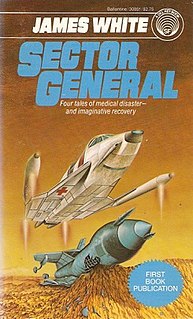
Sector General is a 1983 science fiction story collection by author James White and is part of the Sector General series. The book includes four stories.

The Alternate Asimovs (1986) is a collection of early science fiction drafts by American writer Isaac Asimov. Asimov mostly threw away early drafts. Just a few survived and were included in this anthology.

Forty Thousand in Gehenna, alternately 40,000 in Gehenna, is a 1983 science fiction novel by American writer C. J. Cherryh. It is set in her Alliance-Union universe between 2354 and 2658, and is one of the few works in that universe to portray the Union side; other exceptions include Cyteen (1988) and Regenesis (2009).

Across the Sea of Suns is a 1984 hard science fiction novel by American writer Gregory Benford. It is the second novel in his Galactic Center Saga, and continues to follow the scientist Nigel Walmsley, who encountered an extraterrestrial machine in the previous book, In the Ocean of Night, aboard an expeditionary spacecraft, searching for life. Eventually Nigel discovers evidence of the major conflict in the galaxy.
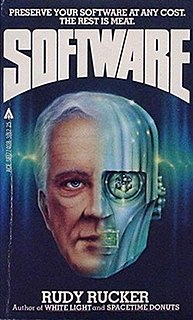
Software is a 1982 cyberpunk science fiction novel written by Rudy Rucker. It won the first Philip K. Dick Award in 1983. The novel is the first book in Rucker's Ware Tetralogy, and was followed by a sequel, Wetware, in 1988.
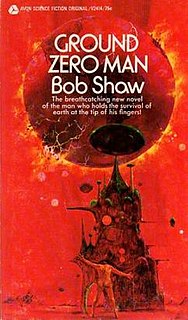
Ground Zero Man is a science fiction novel by British writer Bob Shaw, first published in 1971, and then revised as The Peace Machine in 1985.

Black Star Rising, published in 1986, is a dystopian science fiction novel by American author Frederik Pohl. It is about a post-nuclear war future in which a conquered United States becomes a Chinese farming colony. The main character is an American who the Chinese send to meet a race of warlike aliens who come to Earth.
The Tides of Time (ISBN 0-345-31838-2) is a science fiction novel by John Brunner. It was first published in the United States by Ballantine Del Rey Books in 1984. The novel tells the story of two people on an isolated island, each time they awoke from sleep, they lived a different life in a different time.

The Years of the City is a novel by Frederik Pohl published in 1984.

Chernobyl is a novel by Frederik Pohl published in 1987. It is based on the 1986 Chernobyl disaster.


















